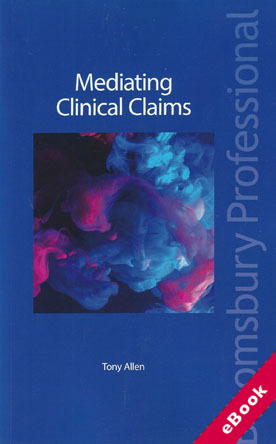
The device(s) you use to access the eBook content must be authorized with an Adobe ID before you download the product otherwise it will fail to register correctly.
For further information see https://www.wildy.com/ebook-formats
Once the order is confirmed an automated e-mail will be sent to you to allow you to download the eBook.
All eBooks are supplied firm sale and cannot be returned. If you believe there is a fault with your eBook then contact us on ebooks@wildy.com and we will help in resolving the issue. This does not affect your statutory rights.
The NHS Litigation Authority (now NHS Resolution - 'NHSR') 2015/16 annual report stated that the authority received 10,965 clinical negligence claims.
The estimated proportion of what the NHS expend on legal costs is over one-third of their total outlay. The efficient, economic and acceptable resolution of clinical claims is a matter of pressing urgency for the cash-strapped NHS.
As part of its examination into the best ways to achieve efficient, economic and acceptable resolution of clinical claims, The NHSLA (now the NHSR) ran a mediation scheme from mid-2014 to the end of 2015. Following the success of the pilot scheme, NHSR have promulgated a permanent mediation scheme. CEDR is one of the two appointed suppliers of mediations to this scheme, with Tony Allen being one of the leading mediators.
One of the leading cases dealing with mediation generally is an appeal relating to a clinical negligence claim – Halsey v Milton Keynes NHS Trust – probably the most discussed decision in the whole area of mediation. A very significant part of the Halsey judgment which had a very considerable impact on subsequent practice about whether judges can require parties to use mediation has been unofficially recanted in principle. Tying down what Halsey precisely means a decade since it was decided is important for mediation in general, and in particular for the mediation of clinical claims.
Clinical negligence mediation is one of the most emotion-driven forms of mediation. Undertaking a clinical negligence mediation enables parties to discuss remedies not available in court, including fast dispute resolution; improving clinical processes and procedures; avoiding damaging publicity; apologies or compensation where appropriate and the ability to restore relationships and trust.
With the use of mediation of clinical claims increasing year on year Mediating Clinical Claims dispels the ignorance of what mediating clinical claims involves. It:-